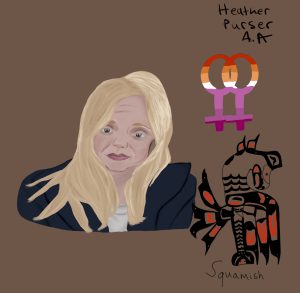25 Heather Purser (she/her)
By Vanessa T. Huynh (he/she)

What would you do for love? Would you be satisfied with taking your partner’s last name but not officially being married? Let’s look at Heather Purser, the first to suggest legalizing same-sex marriage for the Suquamish Tribe.
Heather Purser is a part of the Suquamish Tribe in Suquamish, Washington, a commercial diver, and an Oral History Project coordinator. She is openly lesbian and has advocated for same-sex rights in the tribe a couple of years prior, speaking to the members of her tribe and asking their opinions before advocating for same-sex marriage.
Purser knew she was gay at the age of seven. From childhood, seeing a gay character on TV and by how her sister explained it; she knew it was a fit for her. When she was older, Purser met a gay couple at her niece’s birthday who were only married in name. At that moment, Purser knew she had to bring up the topic to the tribe. By the age of 20, she went through abuse and discrimination from her family and the higher education community at Haskell College. While at Haskell College, an Indigenous university in Kansas, Purser was targeted for harassment because of her uncommon features, being pale and a redhead. Her tribe back home was used to her features, and her family shared similar characteristics, however, at the university, there were not many similar to her. Being attracted to women meant her family was not accepting but that did not prevent her from connecting with her Indigenous roots or her sexual orientation and beliefs. Purser attended Western Washington University after Haskell College, which was an eye-opening experience for her. Having her voice heard and seeing how individuals can be encouraging and supportive of differences, made her want to do the same for her community.
The Suquamish Tribe was the third Native tribe to legalize same-sex marriage. For Purser, it was a four-year process, from 2008 to 2011, and multiple meetings with the Suquamish Tribe council members. The council members stated they would “consider” it and assigned her a tribal lawyer. However, the progress was very slow during the first three years. It was not until 2011, when she had enough of the waiting, and stood in front of the annual council meeting, speaking to 300 tribal and council members about legalizing same-sex marriage. At that moment, everyone unanimously agreed and decided to become an open community for anyone LGBTQ+. The council extended marriage rights to same-sex couples through a public meeting before it was officially adopted into law on August 1st, 2011.
In the following months, Purser was awarded the Human Rights Award on Seattle Human Rights Award Day, February 16th, 2012, for same-sex marriage activism. Now, she is living with her partner. Purser is an Oral History Project coordinator and commercial diver for the tribe. As of 2012, she is working on a canoe project where women can protest on the water against domestic abuse in their tribe.

